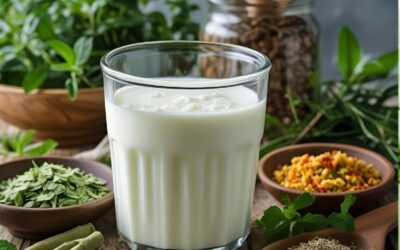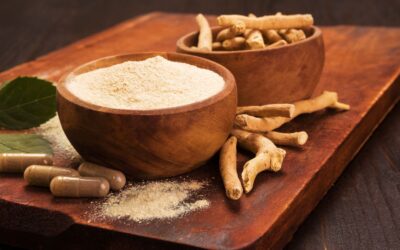What is Shatavari?
Shatavari (Asparagus racemosus) is a deeply nourishing herb celebrated in Ayurveda for supporting female vitality, hormonal balance, and reproductive strength. The name “Shatavari” is rooted in Sanskrit, meaning “she who possesses a hundred husbands”, symbolising its powerful role in enhancing fertility and nurturing female health across all life stages. It is also interpreted as “one that cures a hundred diseases”. Naturally found in India, Sri Lanka, parts of Africa, and Australia, Shatavari is known as a Rasayana – a rejuvenating herb that promotes long-term wellness and resilience in both women and men.
How It Supports Women’s Health (Traditional Ayurvedic Perspective)
Shatavari is a complete female wellness herb, used for all stages of a woman’s life – from puberty to menopause and beyond. According to Ayurveda, its cooling, unctuous, and nourishing qualities support:
- PCOS and Irregular Periods: helps regulate menstrual cycles by balancing Vata and Pitta, and reducing excess androgens
- Infertility & Conception: nourishes reproductive tissues (Shukra Dhatu), supports egg formation and uterine health
- Pregnancy & Postpartum: rejuvenates uterus, supports emotional balance, and promotes tissue recovery (consult ayurvedic doctor)
- Lactation: acts as a galactagogue, increasing breast milk naturally
- Menopause: its adaptogenic quality helps ease hot flashes, mood swings, dryness, sleep issues
- Hormonal Imbalance: supports healthy estrogen balance due to phytoestrogenic compounds
- General Women’s Health: builds strength, stabilizes mood, improves emotional resilience and libido
Other Health Benefits of Shatavari
- Anti-aging, both internally (slows cellular degeneration) and externally (maintains youthful skin and vitality)
- Strengthens lung and respiratory tissues, especially during recovery from seasonal allergies or chronic cough
- Builds immune resilience by nourishing deeper tissues and calming inflammation
- Helps maintain healthy skin by reducing internal heat and promoting natural glow
- Aids in tissue repair and speeds up recovery after illness, surgery, or childbirth
- Supports mental clarity and emotional stability during hormonal transitions
- Gives energy and reduces fatigue and adrenal exhaustion
- Promotes moisture balance in body tissues, preventing dryness in skin, joints, and mucous membranes
- Encourages deep restful sleep and supports nervous system rejuvenation
Can Shatavari Be Used by Men?
Yes, absolutely. While it is known for women’s wellness, Shatavari benefits men too:
- Stress relief & mental calmness – through its adaptogenic properties
- Improved digestion – soothes gut and enhances absorption
- Reproductive strength – supports semen quality and quantity
- Anti-inflammatory & immune-supporting – supports respiratory tract and urinary system
- Due to its mild estrogenic effect, it should be used moderately by men.
- Always consult an Ayurvedic doctor before long-term or high-dose medicinal use
Forms & Usage
- Powder (Churna) – traditionally taken with warm milk or ghee
- Tablets & Capsules – convenient and widely available
- Liquid Extracts or Ghrita (herbal ghee) – used for deeper nourishment
Precautions
- Use with caution in estrogen-sensitive conditions like fibroids, endometriosis, or hormone-related cancers
- Shouldn’t consume without prescriptions during chronic illness, pregnancy, children, old or weak individuals.
- May not suit individuals with very high Kapha or fluid retention
- Always consult an Ayurvedic physician before starting in medicinal form
Research and Scientific Evidence
- Acts as a natural adaptogen, supporting the body’s ability to manage stress, restore hormonal balance, and reduce anxiety
- Animal studies show estrogen-like activity, improved fertility indicators, and increased milk production in lactation models
- Contains powerful antioxidant compounds like asparagamine A and racemosol, which contribute to its anti-aging and immune-supporting effects
- Shown to help lower blood sugar in diabetic models and protect against gastric ulcers
- Potential to support urinary tract health and improve mood in cases of mild depression or emotional fatigue
Asparagus Available in UK – Is It the Same?
- No – the commonly eaten asparagus in UK (Asparagus officinalis) is different from Shatavari (Asparagus racemosus)
- However, it still offers great health benefits:
- Rich in vitamin K, folate, fibre, and antioxidants
- Acts as a natural diuretic – supports kidney and bladder
- Supports gut health, healthy cholesterol, and heart function
Conclusion
Shatavari is a powerful Ayurvedic herb that supports mental, reproductive, and emotional health across all stages of a woman’s life. Its ability to balance hormones, calm the mind, nourish tissues, and promote vitality makes it a key ally in holistic women’s wellness. Whether you’re dealing with cycles, fertility, menopause, or postnatal recovery or simply seeking balance, Shatavari offers gentle yet profound support.
AI Ayurveda Imma – Your Guide to Ayurvedic Living in the UK | Zen Wellness
Be slow in choosing, sure in living – Choose Ayurveda.
With Wellness
Imma Antonisamy




